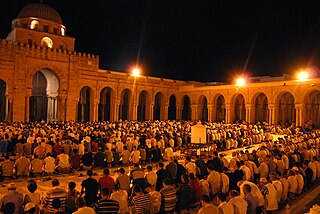This article needs additional citations for verification .(June 2022) |
This is a list of prayers for various religions.
This article needs additional citations for verification .(June 2022) |
This is a list of prayers for various religions.
Source: [1]
Christian prayers specific to the Eastern Orthodox Church and those Eastern Catholic Churches which follow the Byzantine Rite:
Salah , ritual Islamic prayer, prescribed five times daily:
Besides the five daily prayers, other notable forms of salaah include:
The Vedas are a collection of liturgy (mantras, hymns). Stuti is a general term for devotional literary compositions, but literally means praise.
The Hindu devotional Bhakti movements emphasizes repetitive prayer. Stemming from the universal Soul, or Brahman, prayer is focused on the personal forms of Devas/Devis, such as Vishnu, Vishnu's Avatars, Rama & Krishna, Shiva as well as Shakti, or Shakti's forms such as Lakshmi or Kali. Ganesha is also a popular deity in Bhakti.
Before the process of ritual involving the invoking of various deities for the fulfillment of needs (great/small, varying in urgency), came the human aspiration for the highest truth. The foundational monism of Hinduism pertains to the one Brahman. Brahman, which summarily can be called the unknowable, true, infinite and blissful Divine Ground, is the source & being of all existence from which the Cosmos spring. This is the essence of the Vedic system. The following prayer was part & parcel of all Vedic ceremonies, continuing to be invoked in Hindu temples presently throughout India and the World.
The Sikhs believe in going to bed early, then waking up early the next morning. The Sikhs call early morning as Amrit wela. Most of the Sikhs (especially baptized) wake up at this time of day and pray
In the morning most of the Sikhs recite the path by sitting with their family or sitting alone. They recite 5 paths (holy chapters) as directed by the tenth guru of Sikhs Sri Guru Gobind Singh.
The list of 5 paths is:
They try to perform these prayers on a daily basis.
In the evening the Sikhs perform the path of Rehraas Sahib.
During night time the Sikhs recite Kirtan Sohila before sleeping.
Though the Sikhs pray these special prayers they are always in touch with their God by reciting Waheguru for the whole day, follow the orders of their Guru Nanak Dev Ji to do work but keep their attention towards God.

Arti or Aarati is a Hindu ritual employed in worship, part of a puja, in which light from a flame is ritually waved to venerate deities. Arti also refers to the hymns sung in praise of the deity, when the light is being offered. Sikhs have Artikirtan which involves only devotional singing; the Nihang order of Sikhs also use light for arti.

The Maghrib prayer is one of the five mandatory salah, and contains three cycles (rak'a). If counted from midnight, it is the fourth one.

Japji Sahib (Punjabi: ਜਪੁਜੀ ਸਾਹਿਬ, pronunciation: ) is the Sikh thesis, that appears at the beginning of the Guru Granth Sahib – the scripture of the Sikhs. Jap is the original name of the prayer and to show respect, it is called Japji Sahib. It was composed by Guru Angad, and is mostly the writings of Guru Nanak Dev Ji. It begins with Mool Mantra and then follow 38 paudis (stanzas) and completed with a final Salok by Guru Angad at the end of this composition. The 38 stanzas are in different poetic meters.

Jaap Sahib is the morning prayer of the Sikhs. The beaded prayers were composed by the Tenth Sikh Guru, Guru Gobind Singh and is found at the start of the Sikh scripture Dasam Granth. This Bani is an important Sikh prayer, and is recited by the Panj Pyare while preparing Amrit on the occasion of Amrit Sanchar (initiation), a ceremony held to Amrit initiates into the Khalsa and it is a part of a Sikh's Nitnem. The Jaap Sahib is reminiscent of Japji Sahib composed by Guru Nanak, and both praise God.

The Isha prayer is one of the mandatory five daily Islamic prayers, and contains four cycles.

The fajr prayer, alternatively transliterated as fadjr prayer, and also known as the subh prayer, is a salah offered in the early morning. Consisting of two rak'a (units), it is performed between the break of dawn and sunrise. It is one of two prayers mentioned by name in the Qur'an. Due to its timing, Islamic belief holds the fajr prayer to be of great importance. During the Islamic holy month of Ramadan, Muslims begin fasting with the fajr prayer.

The Zuhr prayer is one of the five daily mandatory Islamic prayers (salah). It is observed after Fajr and before Asr prayers, between the zenith of noon and sunset, and contains 4 rak'a (units).

The Asr prayer is one of the mandatory five daily Islamic prayers.

Japa is the meditative repetition of a mantra or a divine name. It is a practice found in Hinduism, Jainism, Sikhism, and Buddhism, with parallels found in other religions.

A Rak'a is a single iteration of prescribed movements and supplications performed by Muslims as part of the prescribed obligatory prayer known as salah. Each of the five daily prayers observed by Muslims consists of a number of raka'at.

Tarawih are special Sunnah prayers involving reading long portions of the Quran, and performing up to 20 rakahs, which are performed only in the Islamic month of Ramadan. The entire Quran is recited in the Tarawih prayers at a mosque, typically at the rate of one Juz' per night.
Shabda is the Sanskrit word for "speech sound". In Sanskrit grammar, the term refers to an utterance in the sense of linguistic performance.

Nitnem is a collection of Sikh hymns (Gurbani) to be read minimally 3 different times of the day. These are mandatory and to be read by every Amritdhari Sikh as expressed in the Sikh Rehat Maryada. Optionally additional prayers may be added to a Sikh's nitnem. There are five hymns (Five Banis) to be done during Amrit Vela, the Rehras Sahib hymn for the evening and Kirtan Sohila for the night. The morning and evening prayers should be followed by an Ardaas.

In Islam, a Nafl Prayer, or optional prayer, is a type of a non-obligatory prayer. They are believed to give extra reward to the person performing them, similar to sunnah prayers.

A Sunnah prayer is an optional or supererogatory salah that can be performed in addition to the five daily salah, which are compulsory for all Muslims. Sunnah prayer have different characteristics: some are done at the same time as the five daily compulsory prayers, some are done only at certain times, or only for specific occasions ; some have their own name and some are identified by how they are performed. The length of Sunnah prayer also varies.
Naam Karan refers to the Sikh ceremony of naming a child, typically conducted at a Gurdwara, a Sikh place of worship.

Salat times are prayer times when Muslims perform salat. The term is primarily used for the five daily prayers including the Friday prayer, which takes the place of the Dhuhr prayer and must be performed in a group of aibadat. Muslims believe the salah times were revealed by Allah to Muhammad.
Holy Du'ā is the mandatory Nizari Isma'ili prayer recited three times a day: Fajr prayer at dawn, Maghrib prayer at sundown and Isha prayer in the evening. Each Holy Du'a consists of 6 rakat, totaling 18 per day, as opposed to the 17 of Sunni and Twelver salat (namaz).

Salah is the practice of formal worship in Islam, consisting of a series of ritual prayers performed at prescribed times daily. Facing the Kaaba in Mecca, it consists of units known as rak'ah, which include a specific set of physical postures, recitation from the Quran, and prayers from the Sunnah. The number of rak'ah varies depending on the specific prayer. Variations in practice are observed among adherents of different madhahib. The term salah may denote worship in general or specifically refer to the obligatory prayers performed by Muslims five times daily, or, in some traditions, three times daily.
Fixed prayer times, praying at dedicated times during the day, are common practice in major world religions such as Islam, Judaism, and Christianity.